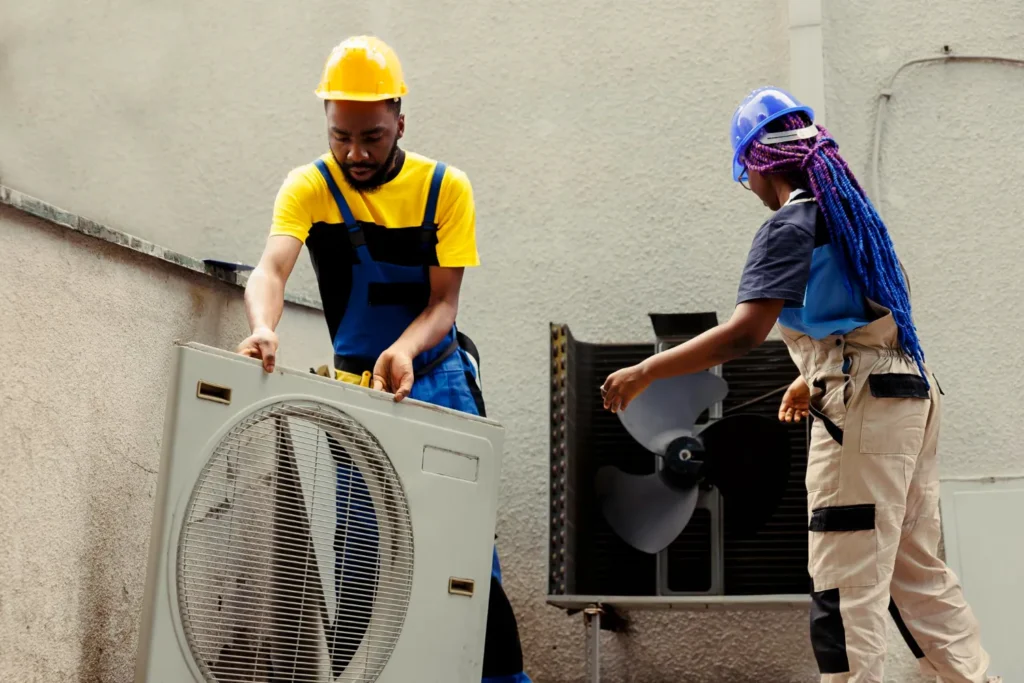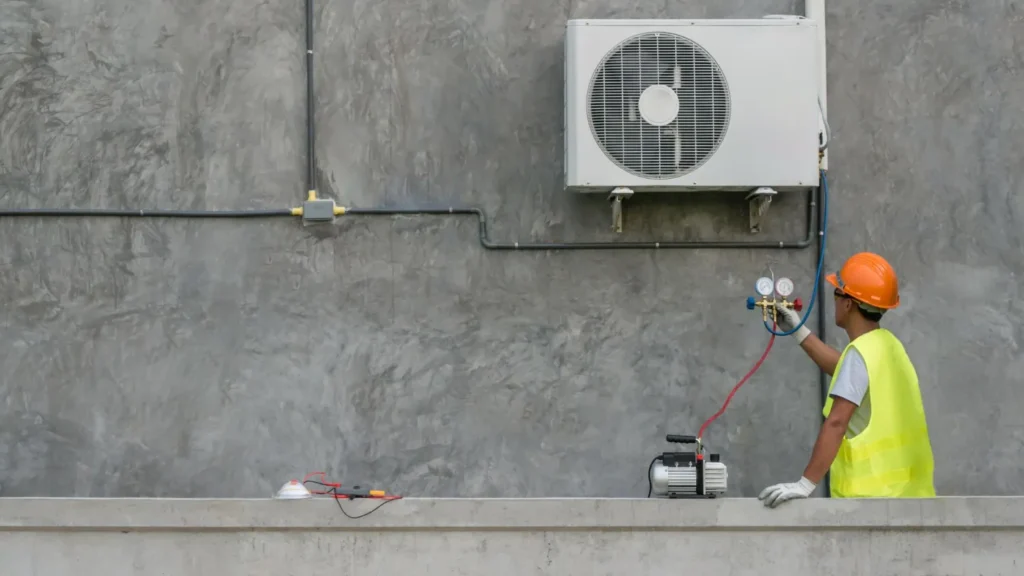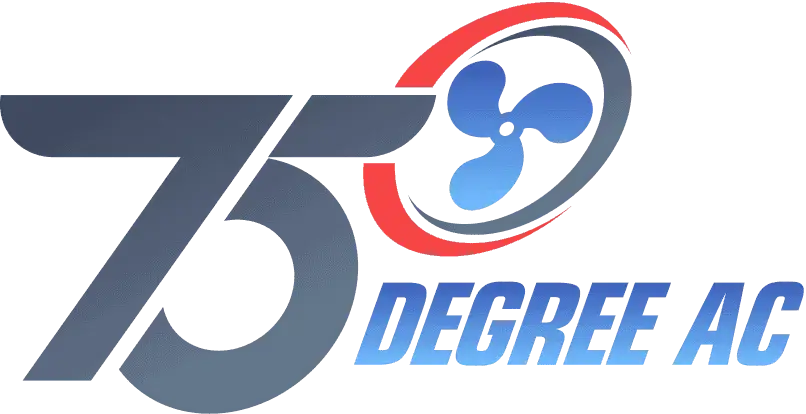Maintenance of your air conditioning system is crucial to ensure optimal performance, especially in states like Texas, where weather can be unpredictable. A well-functioning AC unit not only keeps your home cool during scorching summers but also contributes to better air quality. In this blog post, we will discuss the top five common issues plaguing air conditioning systems that homeowners in Sugar Land, TX, should be aware of.
One of the most Common AC Faults is a clogged condensate drain, which can cause the unit to run inefficiently and make strange noises. Likewise, a dirty air filter can lead to overheating, poor air quality, and increased utility bills if not replaced regularly. Low refrigerant levels can also cause your system to malfunction, requiring immediate attention from a professional service technician. Additionally, issues with the outdoor unit or blocked vents and registers can lead to further complications that may disrupt your comfort at home. It is crucial to address these common AC problems promptly to prevent costly repairs or system breakdowns.
Table of Contents
ToggleKey Takeaways:
- Clogged Condensate Drain: A common issue that can cause your AC unit to run inefficiently and make extra noise. Regular maintenance can help prevent this problem.
- Dirty Air Filter: Excess dirt and debris in the air filter can lead to overheating, inefficiency, and poor air quality. Regular filter replacements and cleanings are crucial for optimal AC performance.
- Low Refrigerant Levels: Low refrigerant levels can cause your AC unit to run hotter, make more noise, and even freeze up. It is crucial to have a professional technician address and refill refrigerant levels promptly.
Dirty and Clogged Filters

Recognizing a Dirty Filter
There’s a common issue that many homeowners face with their air conditioning units – dirty and clogged filters. One of the easiest ways to recognize if you have a filthy filter is through decreased airflow and efficiency of your AC system. You may also notice an increase in dust circulation in your home, poor air quality, and higher energy bills. A dirty filter can cause your AC unit to work harder than usual, leading to potential overheating and breakdowns.
Step-by-Step Guide to Cleaning and Replacing Filters
To adequately address the issue of dirty filters, it is necessary to regularly clean or replace them. This simple maintenance task can significantly improve the efficiency and longevity of your AC unit. Below is a step-by-step guide to cleaning and replacing filters:
| Cleaning Filters | Replacing Filters |
|---|---|
| Turn off the AC unit and locate the filter. | Purchase a new filter that matches the size and type of your current filter. |
| Remove the filter and gently clean it with a vacuum or warm, soapy water. | Turn off the AC unit and locate the filter. |
| Let the filter dry completely before placing it back in the unit. | Remove the old filter and dispose of it properly. |
| Regularly check and clean or replace filters every 1-3 months. | Insert the new filter in the same position as the old one. |
This routine maintenance can prevent issues such as overheating, inefficiency, and poor air quality caused by dirty and clogged filters. By following these simple steps, you can ensure that your AC system continues to operate smoothly and effectively.
Refrigerant Leaks and Low Levels
Detecting Refrigerant Problems
The refrigerant in your AC unit plays a crucial role in maintaining its efficiency. Low levels of refrigerant can lead to a range of issues, including overheating and poor performance. One telltale sign of a refrigerant problem is if your AC unit is not cooling as effectively as it should be despite running continuously. You may also notice ice buildup on the evaporator coil, strange noises coming from the unit, or a sudden increase in your energy bills. If you suspect a refrigerant leak, it’s imperative to address it promptly to prevent further damage to your system.
The Procedure for Recharging Refrigerant
A professional HVAC technician should handle refrigerant leaks to ensure the job is done safely and effectively. The process of recharging refrigerant involves locating the leak, repairing it, and then adding the correct amount of refrigerant to the system. Technicians use specialized tools to measure and recharge the refrigerant to the manufacturer’s specifications, ensuring optimal performance and efficiency.
Plus, addressing refrigerant leaks promptly can prevent system breakdowns and prolong the lifespan of your AC unit. Regular maintenance and inspections can help detect and resolve refrigerant issues before they escalate.
Thermostat Malfunctions
All air conditioning systems rely on a functioning thermostat to regulate the temperature in your home. When your thermostat malfunctions, it can lead to a variety of issues with your AC unit. From inaccurate temperature readings to complete system failures, thermostat problems should be addressed promptly to ensure your comfort and the efficiency of your system.
Identifying Thermostat Issues
With the advancements in technology, modern thermostats are equipped with various features that can make troubleshooting easier. If you notice that your AC is not cooling or heating your home correctly, the first step is to check the thermostat settings. Ensure that it is set to the correct temperature and mode. If the issue persists, it may be a sign of a malfunctioning thermostat that requires further inspection by a professional HVAC technician.
Troubleshooting and Repairing Your Thermostat
Malfunctions in your thermostat can be caused by a variety of factors, including aging components, electrical issues, or calibration errors. It is crucial to have a qualified technician diagnose and repair any thermostat problems to prevent further damage to your AC unit. Regular maintenance and calibration of your thermostat can prevent future malfunctions and ensure optimal performance of your air conditioning system.
Issues
Ignoring thermostat malfunctions can lead to inefficient cooling, increased energy consumption, and potential damage to your AC unit. It is essential to address any thermostat issues promptly to maintain a comfortable indoor environment and prolong the lifespan of your air conditioning system.
Drainage Problems
Understanding Condensate Drain Clogs
To effectively cool your home, your air conditioning unit produces condensate that needs to be drained properly. However, over time, this drain can become clogged with debris, causing issues with your AC unit’s functionality. Signs of a clog may include unusual noises, slower cooling times, or increased strain on the system. If left unaddressed, a clogged condensate drain can lead to more severe problems, potentially resulting in a breakdown of your AC unit.
Preventative Measures and Solutions for Drainage Issues
Drainage issues can be prevented through regular maintenance and inspections by a professional AC service. They can clear any obstructions in the condensate drain using specialized tools like a wet-dry vacuum or HVAC snake. It is recommended that you schedule regular maintenance visits to ensure that your air filter and condensate drain are clean and functioning correctly. By staying proactive and taking preventative measures, you can avoid costly repairs and ensure your AC unit operates efficiently.
Regular maintenance visits can save you from potential breakdowns and costly repairs down the line. Make sure to replace your air filter every one to three months and check it regularly for dirt buildup. By addressing drainage issues promptly, you can extend the lifespan of your AC unit and keep it running smoothly throughout the year.
Electrical Control Failures

Keep an eye out for electrical control failures in your air conditioning system, as they can cause severe issues if left unchecked. These failures can lead to your AC unit not turning on, cycling on and off frequently, or not cooling your home effectively. It’s essential to address electrical control issues promptly to prevent further damage to your system.
Signs of Electrical Component Malfunction
Malfunction: One of the critical signs of electrical component malfunction in your AC unit is if it is not turning on or off as expected. If you notice that your system is not responding to thermostat settings or if it is turning on and off frequently, there may be an electrical issue at play. Additionally, if you experience inconsistent cooling in different parts of your home, it could be a sign of electrical control problems.
Diagnosing and Fixing Electrical Problems
Problems: When dealing with electrical issues in your air conditioning system, it is crucial to have a professional technician diagnose and fix the issues. Attempting to repair electrical components without the proper knowledge and tools can be dangerous and may cause further damage to your system. An experienced technician will be able to accurately diagnose the issue and safely repair any faulty electrical controls in your AC unit.
Diagnosing: A technician will use specialized tools and equipment to assess the electrical components of your AC unit. They will check for loose connections, faulty wiring, and malfunctioning capacitors or relays. Once the issue is identified, the technician will proceed with the necessary repairs to ensure your system is functioning smoothly and efficiently.
Outdoor Unit Complications
Dealing with Outdoor Unit Obstructions
After years of service, your AC unit’s outdoor component may start experiencing complications due to debris and blockages. One common issue is the accumulation of leaves and branches in the system, hindering its performance. This can lead to the unit running hot, making strange noises, or even shutting down entirely. If you notice any of these signs, it is crucial to contact a professional AC technician to address the problem.
Maintenance Tips to Prevent Outdoor Unit Issues
A crucial aspect of maintaining your AC unit is preventing issues with the outdoor component. Inspecting and clearing any obstructions can ensure the efficient operation of your system. To avoid blockages, keep an eye on nearby items that may contribute to debris buildup. Additionally, scheduling routine maintenance visits with a local AC service can help identify and address any potential issues before they escalate.
- Regularly inspect and clean outdoor units of debris.
- Schedule routine maintenance visits with the AC service
The outdoor unit of your AC system plays a crucial role in its overall performance. Ensuring that it remains free of obstructions and well-maintained can prevent potential breakdowns and prolong the lifespan of the unit.
Airflow and Duct Obstructions
Checking for Proper Airflow
Unlike some AC issues that may be immediately noticeable, airflow and duct obstructions can be more subtle but just as damaging to your system. Proper airflow is imperative for your air conditioner to cool your home efficiently. One way to check for adequate airflow is by feeling the air coming out of your vents. If the air feels weak or some rooms are not getting enough airflow, there may be obstructions in your ductwork.
Clearing and Maintaining Ductwork for Optimal Performance
Duct obstructions can significantly impact the performance of your AC unit. If your ductwork is blocked, your system will have to work harder to push air through, leading to inefficiency and potentially costly repairs. An experienced technician can inspect your ductwork for any obstructions or leaks and clear them to ensure optimal performance of your AC unit. Regular maintenance of your ductwork is crucial in preventing future obstructions and maintaining the efficiency of your system.
An obstructed duct can not only hinder the airflow in your home but also lead to increased energy consumption and potential damage to your AC unit. By having your ductwork cleaned and maintained regularly by a professional, you can ensure that your system operates at its best, saving you time and money in the long run.
Checking and clearing your ductwork is imperative for ensuring optimal airflow in your home and preventing potential damage to your AC unit. Regular maintenance by a professional can help maintain the efficiency of your system and prevent costly repairs.
Mechanical Wear and Tear
Recognizing Wear on AC Components
For homeowners in Sugar Land, TX, it’s crucial to be aware of the signs of mechanical wear and tear on AC components. Over time, your air conditioning system may start showing signs of aging, such as unusual noises, reduced efficiency, or slow cooling. These issues can indicate problems with crucial components like the condensate drain, air filter, refrigerant levels, or outdoor unit. Recognizing these signs early on can help prevent major breakdowns and costly repairs.
Strategies to Prolong AC Lifespan and Efficiency
The lifespan of an air conditioner can significantly depend on how well it is maintained. Regular maintenance is critical to prolonging the lifespan and maintaining efficiency. Scheduling professional inspections, cleaning or replacing air filters, checking refrigerant levels, and ensuring proper airflow through vents are all imperative tasks. Additionally, keeping the outdoor unit free from debris and blockages can help prevent malfunctions. By staying proactive with maintenance, homeowners can ensure their AC system operates smoothly and efficiently for years to come.
Regular maintenance is crucial to maintaining the efficiency and lifespan of your air conditioning system. By ensuring components are in good condition and addressing issues promptly, you can avoid major breakdowns and keep your home cool and comfortable.
Summing up – Most Common AC Faults

Ensuring that your air conditioning system is functioning correctly is crucial, especially in a state like Texas, where unpredictable weather can quickly turn oppressive. The most common issues that can plague your AC unit include:
- Clogged condensate drains.
- Dirty air filters.
- Low refrigerant levels.
- Malfunctioning outdoor units.
- Blocked vents or registers.
These problems can lead to inefficiency, increased energy costs, and even system breakdowns. It is essential to address these issues promptly to avoid further complications.
Attempting to repair or replace an AC unit without the necessary expertise can lead to additional problems and safety hazards. It is always advisable to seek the services of experienced AC technicians to diagnose and resolve any issues with your system correctly. Regular maintenance and inspections can also help prevent common AC problems and ensure that your unit operates efficiently, keeping your home cool and comfortable regardless of the weather conditions in Sugar Land, TX.
FAQ About Most Common AC Faults
What is the most common issue that can plague an air conditioning system?
The most common issue that can plague an air conditioning system is a clogged condensate drain. This can cause your unit to run inefficiently and may lead to other problems if not addressed promptly.
How often should I replace my air filter to prevent AC issues?
It is recommended that you replace your air filter every one to three months to prevent issues such as overheating, inefficiency, and poor air quality. Regular maintenance can extend the life of your AC unit.
What should I do if I suspect that my refrigerant levels are too low?
If you suspect that your refrigerant levels are too low, it is best to schedule a visit from a service technician. Low refrigerant can cause your AC unit to run hotter and less efficiently, potentially leading to a total shutdown.
How can I prevent issues with my outdoor AC unit?
To prevent issues with your outdoor AC unit, regularly check for debris, such as leaves and branches, that may get caught in the system. Keep the area around the unit clean and free of obstructions to ensure proper functioning.
Why should I hire an experienced AC technician for repairs?
Repairing or replacing an AC unit requires specific skills and qualifications to ensure the job is done correctly and safely. Hiring an experienced AC technician can save you time and money and prevent further damage to your unit.
